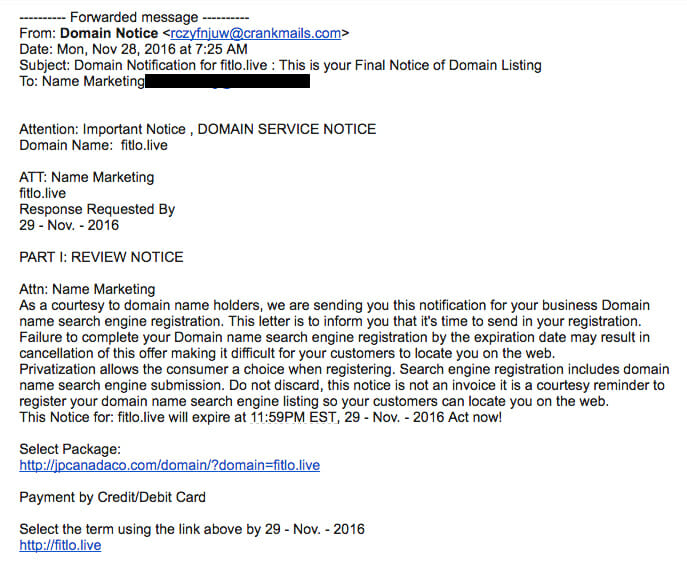Sad as it is to say, there are a lot of scams out there that revolve around domain names. One of the most common domain scams is phony renewal notices, usually communicated via phone, snail mail, or email. So when we recently received a phony domain renewal email to our marketing account, we figured it was the perfect opportunity to show you how to spot a domain registration scam and avoid falling victim to it.
How to identify a domain renewal scam
We recently received this email regarding our domain, fitlo.live.

There’s a few things right away that appear pretty fishy … and should indicate that something is amiss. The first and most obvious sign that it’s a scam is that it’s clearly not from Name.com, where the domain is registered—it has none of our branding, doesn’t come from a Name.com email address, and does not contain links to our website. Then look at the “From” field—not only is the sender called “Domain Notice” rather than a personal or company name, but it also comes from the email address [email protected]. Not exactly the most trustworthy sounding fellow.
Go down the page a little more, and you’ll also see the URL listed under the “Select Package” headline (which doesn’t even make sense in the context of domain renewals anyway). The URL, jpcanadaco.com, does not match the sender email address and makes it clear that it is not coming from Name.com or any other trusted registrar.
And then there’s this part at the bottom:

This is telling because of its failure to meet CAN-SPAM requirements. A credible business that’s sending an email for marketing purposes is required to display certain information, including an address, a clear identity from the sender, and more. And although the email does make it seem like there’s a way to opt out (by replying with the word “Unsubscribe”), most credible email services will have a link in the footer for this purpose instead.
How you can protect yourself from domain scams?
One of the best ways to prevent these phony notifications from being sent to you is to to protect your personal information with Whois Privacy. Many scammers receive their information from the Whois database, a public directory of domain names and their owners that exists as part of an ICANN requirement. But if you have Whois Privacy for your domain names, personal information such as your name, email address, and home address are hidden from view, preventing your contact details from being accessed by spammers.
Being smart and vigilant when you receive notices about your personal accounts is also essential for keeping your domains and information safe. By simply reading through the entire email and paying attention to noticeable details, it becomes clear that it is not coming from a credible source. Avoid blindly clicking links and entering sensitive information in ANY email communication without first ensuring that it’s coming from a trusted source.
Want more tips on how to keep your website and personal information safe? Sign up for Name.com’s weekly blog digest.
